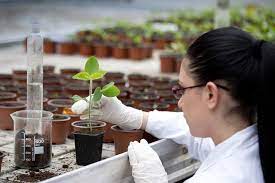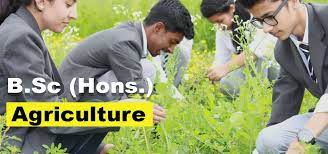B.Sc Agriculture Courses
B.Sc Agriculture Courses

"Cultivating Sustainability: B.Sc. in Agriculture for a Greener Future"
At its core, agriculture involves the cultivation of plants and the rearing of animals for various purposes. Crop cultivation includes activities like preparing soil, planting seeds, nurturing plants, and harvesting the resulting produce. This can range from staple crops like wheat, rice, and corn to specialized crops like fruits, vegetables, and herbs.
Give A Miss Call For Apply B.Sc Agriculture Courses and other Courses :91 9507799452
New Abloom Services
Concerned with New Abloom Services for better and effective result.
Agriculture is the practice of cultivating crops, raising animals, and other activities related to the production of food, fiber, and other materials used to sustain human life. It is a fundamental cornerstone of human civilization and encompasses a wide range of practices that have evolved over time.
- B.Sc Agriculture Courses programs provide a diverse curriculum covering fields like crop science, animal husbandry, economics, and environmental sustainability.
- Students engage in hands-on experiences through fieldwork, labs, and internships, honing their skills in real-world agricultural settings.
- The degree offers opportunities to specialize in areas such as agribusiness, agricultural engineering, plant genetics, and more..
- Graduates contribute to sustainable food production, resource management, and rural development, addressing critical challenges in agriculture on a global scale.
- Know more about B.Sc Agriculture and other courses. Contact Us for Apply
Get Free Consult for B.Sc Agriculture Courses and other Courses - Call Now on +91 9507799452
Eligibility Criteria for B.Sc Agriculture Courses :
- Typically, candidates should have completed their higher secondary education (10+2) in the science stream with subjects like Biology, Chemistry, and Physics.
- Many institutions require candidates to have a minimum percentage in their 10+2 exams, often ranging from 50% to 60%..
- Admission to B.Sc. Agriculture programs may involve clearing relevant entrance exams, which assess the candidate’s knowledge in subjects like Biology, Chemistry, and Mathematics.

Benefits of B.Sc Agriculture Course
Diverse Career Opportunities: Graduates can enter various sectors, including farming, agribusiness, research, extension services, food processing, and agricultural consultancy, offering a wide range of career paths.
Global Food Security: B.Sc Agriculture Courses equips graduates with the skills to contribute to enhancing food production, addressing the global challenge of feeding a growing population.
Sustainable Practices: Students learn about eco-friendly farming techniques, helping to promote sustainable agriculture and minimize the environmental impact of food production.
Innovation and Technology: The program exposes students to modern agricultural technologies such as precision farming, biotechnology, and data analytics, preparing them for advancements in the field.
Rural Development: Graduates play a crucial role in developing rural areas by introducing improved farming methods, creating employment opportunities, and boosting local economies.
Personal Growth: Studying agriculture fosters a deep connection with nature, cultivates problem-solving skills, and instills a sense of responsibility towards the environment and society, leading to personal and professional growth.
Frequently Asked Questions (FAQs)
B.Sc Agriculture Courses is an undergraduate degree program that focuses on various aspects of agriculture, including crop cultivation, animal husbandry, agribusiness, and sustainable farming practices.
The curriculum typically covers subjects such as agronomy, plant pathology, soil science, agricultural economics, animal science, horticulture, genetics, and agricultural engineering.
Graduates can pursue careers in farming, agribusiness, agricultural research, extension services, food processing, agricultural consultancy, and more.
Yes, a science background is usually required, with subjects like Biology, Chemistry, and Physics being essential for eligibility.
You’ll develop skills in crop management, animal care, sustainable practices, data analysis, problem-solving, and effective communication in the context of agriculture.
Yes, graduates can pursue master’s or doctoral degrees in specialized fields like Agricultural Sciences, Plant Genetics, Agricultural Economics, and more.
